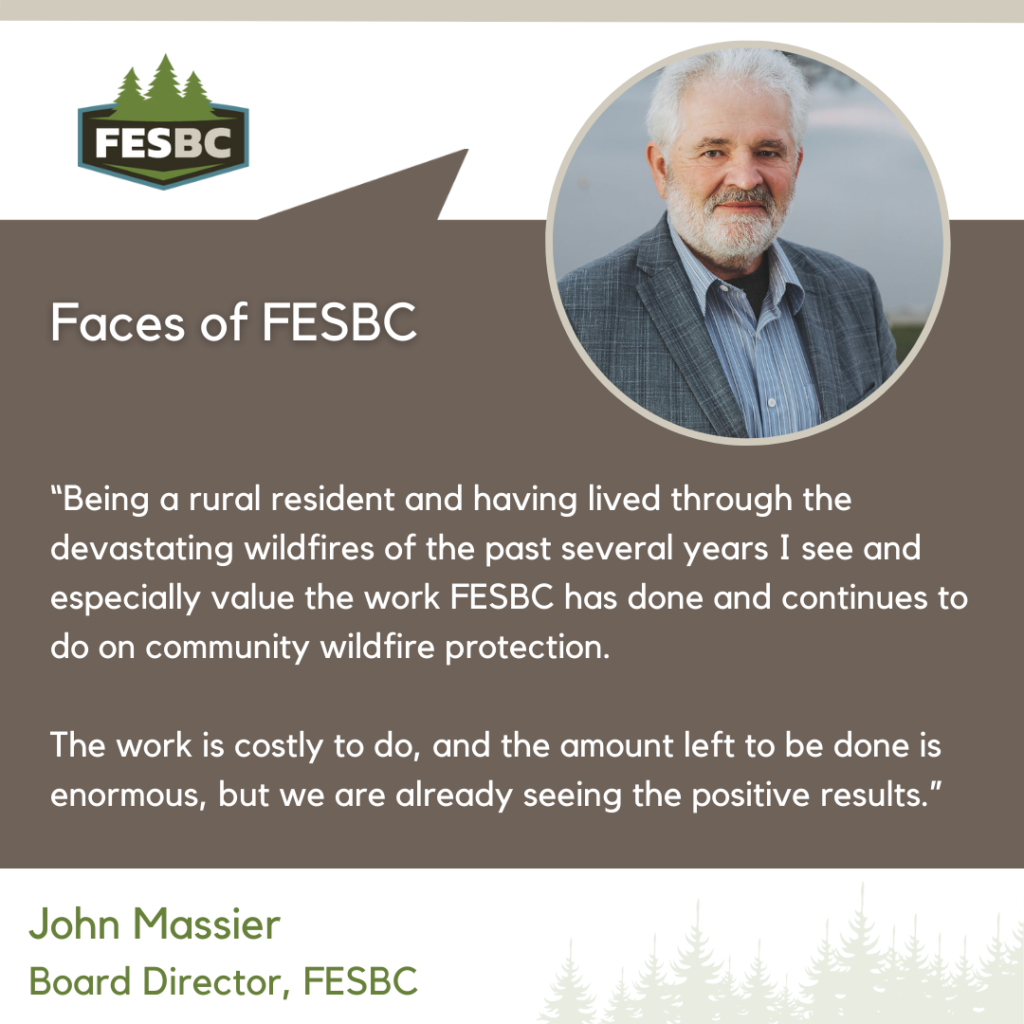Faces of Forestry is an initiative of the Forest Enhancement Society of BC (FESBC) to highlight people doing great work to enhance our forests throughout British Columbia. In this month’s Faces of Forestry, we are featuring a Face of FESBC to highlight one of the exceptional individuals on our Board of Directors who helps guide our organization toward impactful change.
This month, we feature John Massier, one of FESBC’s Board Directors and a leader in the industry with five decades of operational forestry experience.

John’s journey began fifty years ago when he was employed as a tree planter by the Ministry of Forests, setting the stage for a lifelong commitment to sustainable forestry practices.
“Since then, I have worked at a variety of jobs in the forest industry, including tree planter, mill worker, cone picker, faller/bucker and machine operator,” he explained.
In 1978, he founded Cottonwood Reforestation, a small business that contracted a range of bush work, from tree planting to juvenile spacing and other land-based work. Under his leadership, he employed hundreds of people and completed reforestation projects totalling over 40 million trees on more than 300 square kilometres of land in the Cariboo/Chilcotin region of British Columbia. Later, in 1993, John and his wife Hazel were awarded Woodlot 1406 that surrounds their rural home along the Cottonwood River.
Currently, he is the Director for Electoral Area C in the Cariboo Regional District (CRD), as well as the CRD Treaty representative to the Northern Shuswap Tribal Council Treaty Main Table.
Additionally, John’s deep engagement in local governance has solidified his commitment to community and environmental stewardship, leading him to serve on numerous boards over the years, including the Federation of BC Woodlot Associations, the Wells-Barkerville Community Forest, the Woodlot Product Development Council, and the Fraser Basin Council Board.
In 2022, John joined FESBC as a board director and brought his wealth of operational forestry experience and governance expertise.
“I was familiar with FESBC through my forestry work and given my varied experience in the industry and connections to local government, I thought I might offer some value to the organization,” he recalled.
Recognizing the importance of sustainable funding models for forestry initiatives, John advocates for the long-term viability of FESBC’s projects, striving to support the rural and remote communities that serve as the backbone of the industry.
“In my decades in the industry, I have witnessed and been involved in various Provincial and Federal funding programs aimed at enhancing the forest land base, yet the common theme across them was the lack of sustained funding and loss of momentum once each program ran its course,” he said. “I have always believed that any industry as important as forestry is to British Columbia needs a sustainable funding model to enhance the land base that both industry and communities rely on.”
With the recent announcement in the 2024 budget of sixty million dollars for FESBC over the next three years, John is looking forward to continuing supporting communities through wildfire risk reduction work, low-value fiber recovery, habitat enhancement, and Indigenous peoples’ participation in the forest economy.
“Being a rural resident and having lived through the devastating wildfires of the past several years I see and especially value the work FESBC has done and continues to do on community wildfire protection,” he added. “The work is costly to do, and the amount left to be done is enormous, but we are already seeing the positive results.”
Beyond his professional endeavours, John’s love for wildlife drives his volunteerism with the Northern Lights Wildlife Society as one of their capture/transport teams spread around the province.
“Those who have met me know of my love for the wildlife that we get to share our remote rural property and woodlot with. I never miss an opportunity to show the most recent fruits of my motion-sensing wildlife cameras to anyone that’s interested,” he shared.
Thank you, John, for your dedication to environmental conservation and community well-being that deeply exemplifies FESBC’s mission.
